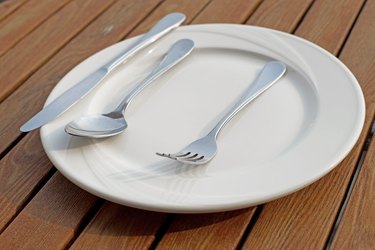
To lose weight you need to eat less, so skipping meals or eating little or nothing for a day may seem like a good idea. But not eating intensifies your hunger, and regularly eating too little or skipping meals can slow your metabolism. The key to losing weight is to find the right balance of calories and exercise to keep you and your metabolism going. If you're struggling to lose weight and tempted to skip meals, consult a registered dietitian to evaluate your current diet and help you develop a meal plan that works.
About Your Metabolism
Video of the Day
It's often associated with calorie burning, but metabolism actually refers to all the chemical reactions that occur in your cells to keep you alive and active. For example, metabolism controls brain and heart function, digestion and physical activity.
Video of the Day
Calories provide the energy required to run all these reactions. Your body requires a certain amount of energy, or calories, to perform basic body functions -- referred to as basal metabolic rate, or BMR. The BMR accounts for most of your daily calorie needs, 40 to 70 percent, according to NHS Choices. You need the remainder to digest food -- 10 calories for every 100 calories you eat -- and for physical activity, whether it's just getting up out of bed or your 5-mile run.
Not Eating and Your Metabolism
When you eat less than 1,000 calories a day, your body works to preserve its resources by going into "starvation mode," which is basically a slowdown in metabolism. There are a few things that happen to cause this slowdown: Not eating restricts your calorie intake, leading to weight loss. While you do lose fat, you also lose muscle. Muscle burns calories, so less muscle tissue means a slower metabolism. Additionally, levels of thyroid hormone and catecholamine, which play a key role in the metabolism, decrease when you don't eat. Also, your body burns fewer calories digesting food, because you're eating less.
Not getting enough calories over a period of 12 weeks may cause your metabolism to slow down by as much as 24 percent, according to a 1991 clinical study published in the Journal of the American Dietetic Association.
Finding the Right Balance
If you're trying to keep your metabolism running strong, you can't stop eating. You need to find the right balance of calories to promote weight loss without your body going into starvation mode. This means eating a minimum of 1,200 calories a day for women and 1,800 calories a day for men, according to the American College of Sports Medicine.
If you're eating the minimum and losing more than 2 pounds a week, you still may not be eating enough. Fast weight loss causes you to lose more muscle than fat, which may lead to that metabolic slowdown. If you're losing too quickly, add calories in 50- to 100-calorie increments until you're losing at a rate of 1/2 to 2 pounds a week.
Working Out to Rev It Up
Unfortunately, even if you're eating enough to take the weight off slowly, your metabolism is going to slow down as your body weight decreases. A 42-year-old 5-foot, 4-inch woman weighing 180 pounds needs 2,000 calories to maintain her weight; after she loses 20 pounds, her needs decrease to 1,900 calories.
Exercise may help limit some of the decline. Regular strength training can decrease muscle loss as you lose weight. As a calorie-burner, maintaining or adding muscle while you lose may keep your metabolism revved up. Do muscle-building exercises at least twice a week -- use free weights, exercise bands or body resistance exercises, such as sit-ups, lunges and pull-ups.
Aerobic activity also helps give your metabolism a boost. You need to get up to 60 minutes of moderate-intensity aerobic exercise -- such as swimming laps or riding a bike -- five days a week.
At 160 pounds, working out an hour a day, the 42-year-old women needs 2,400 calories to maintain her weight.
- NHS Choices: How Can I Speed Up My Metabolism
- UCLA Center for Human Nutrition: Very Low-Calorie Diet Plan
- International Journal of Obesity: Adaptive Thermogenesis in Humans
- McKinley Health Center: Breaking Down Your Metabolism
- Food and Agricultural Organization of the United Nations: Adaptation to Different Energy Intakes
- Britannica: Catecholamines
- Journal of the American Dietetic Association: Effect of a Very-Low-Calorie Diet on Body Composition and Resting Metabolic Rate in Obese Men and Women
- FamilyDoctor.org: What It Takes to Lose Weight
- Centers for Disease Control and Prevention: How Much Physical Activity Do Adults Need?
- Baylor College of Medicine: Adult Energy Needs and BMI Calculator